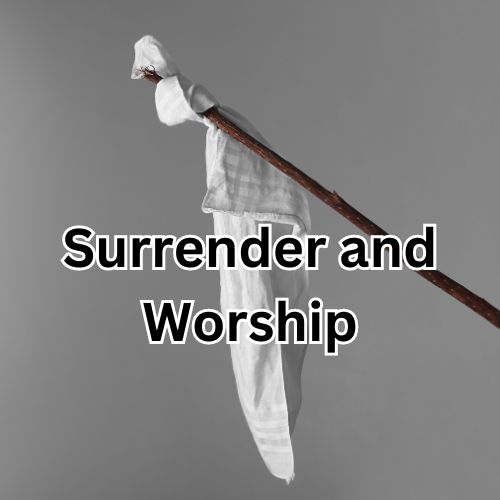
Surrender and Worship

Surrender and Worship
Worship of God and surrender are inseparable—in one sense, they are indistinguishable. Worship and surrender are part of your battle plan for becoming more Christlike. When looking for a church to attend, you may notice that the music played and sung at each church is different. Some churches may sing traditional hymns, while others sing contemporary or Southern Gospel music.
While the Bible does not specify what kind of music we should use while we worship, one thing is abundantly clear: music is a physical expression of our devotion to God. Throughout Scripture, singing, shouting, and playing musical instruments are integral parts of worship because music focuses our attention on God and clears our minds of distractions. It should unite us as a body of believers.
However, worship is not limited to public expressions of awe and religious passion. Authentic public worship is an outgrowth of personal surrender to the will of God. Sometimes, physical displays of reverence are a sham because they lack any real connection to God; they are more about the worshipper than about God. Surrendering our life is the most authentic expression of devotion to God. Paul, in his writings to the Christians in Rome, wrote,
“I beseech you therefore, brethren, by the mercies of God, that ye present your bodies a living sacrifice, holy, acceptable unto God, which is your reasonable service. And be not conformed to this world: but be ye transformed by the renewing of your mind, that ye may prove what is that good, and acceptable, and perfect, will of God.”
Romans 12:1-2 (KJV)
In the verses above, the Apostle Paul pleads with us to present our lives as an offering to God. In the Gospel of John, chapter 4:23 (KJV), we read,
“But the hour cometh, and now is, when the true worshippers shall worship the Father in spirit and in truth: for the Father seeketh such to worship him.”
Your surrender to God reflects the reality of God’s mercy in your life and his commitment to you. He abandoned his throne, position, power, honor, and glory to rescue you from your misery, despair, and separation from him. Then, in his ultimate act of surrender and dedication, he presented himself to pagan Roman authorities and hypocritical religious leaders as a sacrifice for your sins. His earthly life was a picture of pure mercy that ended in the destruction of his life on the cross.
The cross was an act of total surrender: Christ held nothing back. It defines and embodies the meaning of the word surrender. It represents surrender as the overthrow of your self-directed will and its replacement with God’s will. Therefore, your primary motivation for surrender/worship should be the bleeding Christ on the cross, who was wounded for your wrongdoings and numbered with the criminals.
Paul wrote this letter to Christians, yet he felt the need to encourage and plead with them to surrender their lives to God. It is comforting to know that the struggle of staying surrendered is not unique to me; the earliest Christians are my companions in this battle—and yours as well.
Worship is not an isolated, once-in-a-lifetime event. Worship is like the air you breathe. Without a constant supply of air, you suffocate and quickly die. For Christians, life is worship, a daily surrender to God. Surrender is the key to growth and transformation.
Self-worship is an obstruction that blocks God’s power in your life. It prevents you from reaching your full potential and from experiencing the joy of God-focused worship and surrender. It demeans your dreams and hopes, causes you to settle for a life of disappointment, and forces you to value things and experiences that are more hurtful than helpful when viewed from the perspective of your whole lifetime. It leads to a life of regret and troubling memories of what might have been. Self-worship is a failure to be fully human.
The act of surrender, of true worship, always precedes change. It is a leading indicator of Christlikeness, of personal destiny accomplished by the power of God. Surrender is the entrance for God’s rule to enter your life and destroy habits, addictions, and defects that plague your relationships and spoil your future.
Without surrender to God, change is temporary. It rarely lasts, and before long, you will revert to your nightmares and addictions. Without surrender, the only hope for bringing change into your life is willpower, grim determination, and therapy that never ends. You spend your time in an endless search for the root causes that ordained the flaws in your character. Without surrender, you are stuck; you are what you are.
JAMES SURRENDERED EVERYTHING
TO OBTAIN THE OBJECT OF HIS DESIRE
While working at the mission one night, a young man burst uninvited into my office and, with a mixture of pain and conviction, said, “Help me! I don’t want to be this way anymore.” I could see that he was distraught. He had the stench and appearance of a homeless man, the bloodshot eyes of a drunk, and the demeanor of a man desperate for help.
His name was James. Several days before, his wife—tired of his lies, his constant theft of their rent money to buy drugs, and his neglect of her and the children—told him to get out of the house and not come back until he regained his sanity. For a drink of beer and a tiny rock called crack, James was willing to give up his job, wife, children, home, bathtub, dignity, and self-respect. He was ready to destroy his whole life to obtain the object of his desire.
That night in my office, James surrendered his life to Christ. Before that night, he had submitted his life to a substance that eventually destroyed everything of beauty and value in his life. When James surrendered to Christ, God gave him his life back, including his marriage. After he had completed the program offered at the mission, he found a job and began to provide for his family. As further evidence of the power of surrender to God, God lifted James from the gutter to leadership in his church.
BROKENNESS
Most people find the concept of brokenness repulsive. For many, brokenness is synonymous with personal destruction, ruin, loss, or failure. To be broken means that we have reached the limits of our talents and abilities, failed to obtain our goals, cannot “cut the mustard,” are inadequate, and have reached the end of ourselves.
What is brokenness? Does brokenness only occur after the complete loss of everything that you find meaningful? Perhaps. In one sense, brokenness is the result of self-sufficiency and self-confidence. We conclude that we do not have the “right stuff ” to accomplish our dreams and goals. Brokenness is at the end of effort, and it causes us to realize we need help beyond ourselves. It is the recognition of personal or public failure. Brokenness can bring anguish and fear, feelings of instability and uncertainty, personal dread concerning our future, and sometimes our reputation.
Brokenness is the sense of inadequacy and helplessness we experience after the death of someone we love, the breakup of our marriage, the loss of a job, the destruction of our finances, a moral failure, or a business fiasco. Tragedies and failures contribute to our sense of failure and hopelessness, filling us with despair.
The positive lesson of brokenness is our understanding that we are nothing without God despite our skills, intelligence, personal strengths, and public disguises.
Brokenness can also mean you have discovered that your desire to go to another level with God is beyond your ability. It then becomes the starting point for God to change your life. Without it, your life can never grow beyond your strength and labor. With it, you are in a beautiful place of new beginnings where God can begin his work of transformation in your life.
Surrender to God results from recognizing that you cannot defeat your unChristlike habits and other character issues without his help. Submission means that you accept God’s superiority and his claim of authority over your life. In the defeat of your self-will, God requires nothing less than unconditional surrender.
No matter how much you struggle, there are some blockages you cannot remove without God’s intervention.
Here are some examples of obstructions:
- Your marriage may not be in trouble yet, but it may be stuck, more routine and comfortable than exciting and surprising. Predictability and ease have caused you to take your spouse for granted. What you need is a marriage makeover, a new beginning. However, your rut is so deep you cannot escape.
- You are single. You have tried singles groups, church groups, and even online dating sites, but you are still lonely and alone.
- Some of you are miserable and feel powerless to do anything about it. You have postponed happiness for some future date when you meet the right person.
- Your finances seem to be in trouble. You have more debt than income, and your feelings of stress and hopelessness are growing. All your plans to fix the situation have failed.
- You are discouraged by Scripture’s promises, which seem to be for others and not you. Where is God when you need him?
- You may feel that God has abandoned you. It appears he does not care about your hurts, disappointments, sadness, and confusion; consequently, you pretend to play the Christian game, wearing your Christian face to keep up appearances. You do not want others to know what you are thinking.
- Perhaps one or more of your children have gone down a dangerous path; their indiscretions have caused you to respond inappropriately. You do not know how to regain the upper hand or control.
- Life has become dull and tedious, something to be endured and not enjoyed.
- Frustration with our country’s future has reached a boiling point. Nothing you do—vote, knock on doors, make donations, or pray—seems to make much of a lasting difference, and it feels hopeless.
Are you satisfied with your level of surrender to God? I suspect, just like in my life, that your submission has limits. You are afraid to cross certain lines in your quest for moderation and balance. Why are you scared?
Are you worried that if you surrender entirely, God will carry out some horrid plan for your life? Do you trust him enough to surrender completely, without conditions? If there are conditions, it is only a negotiated settlement, not a surrender. What will you do?




